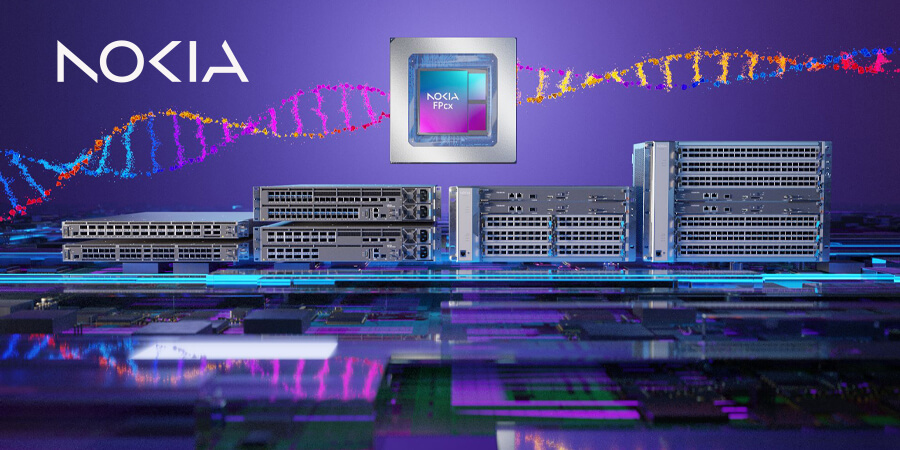Nokia expands its industry-leading IP router portfolio with the introduction of the new 7730 Service Interconnect Router (SXR) product family. The new platforms bring the service router performance, security, assurance and sustainability customers rely on from Nokia at the IP edge and core into advanced IP access and aggregation networks. The scale and capabilities of the new platforms also make them ideal for smaller/distributed IP edge locations, addressing the increased capacity and capability demands driven by broadband investments and evolving cloud network architectures.
All 7730 SXR systems are powered by Nokia FPcx routing silicon, a new line of in-house designed, fully programmable network processors that bring the value of Nokia’s high-performance and feature-rich FP silicon into a compact and extensible package optimized for next-generation IP access, aggregation and edge applications. The 7730 SXR family is also enabled by SR Linux, Nokia’s open, resilient and extensible network operating system (NOS).
Today’s networks are widely recognized as critical infrastructure; however, network architectures are changing. The acceleration of broadband access deployments, including fixed, fixed-wireless access and 5G, is driving the need for more capacity and intelligence deeper into aggregation and metro networks. With applications evolving to cloud-native approaches and the adoption of edge clouds, networks need to become more agile and cloud-like. In addition, the significant proliferation of end devices is contributing to an increased attack surface and security threats.
Current IP access and aggregation routers are typically optimized for simple IP transport applications. At the same time, evolving network architectures result in frequent churn in these networks to meet the needs of new protocols and services, driving up network Capex and Opex costs. The call of the day is to provide secure and assured connectivity on a platform that fully leverages modern network operations and has the silicon and software flexibility to easily adapt to new requirements. This requires a new approach to IP routing in this domain of the network.
Nokia 7730 SXR Access, Aggregation and Edge Routers:
The Nokia 7730 SXR family addresses these requirements by delivering efficiency and flexibility, powered by a unique combination of a next-generation chip architecture and a forward-looking NOS. Secure connectivity is enabled via platform support for MACsec, ANYsec and DDoS mitigation with traffic inspection. Assured IP services are enabled through FPcx’s deterministic performance, advanced QoS capabilities and innovative approach to enabling in-service software upgrades. Power efficiency and reduced TCO are realized through right-sized capacity and interface speeds, support for more efficient network designs and a system built ground-up for automation at scale in a modern NetOps environment. Flexibility is enabled by FPcx as a fully programmable NPU combined with the cloud-native architecture and extensibility of SR Linux.
Solution specifics include:
- New 7730 SXR family of routers provides capacity, interface speeds and form factors that are optimized for IP access, aggregation and smaller/distributed edge locations.
- New Nokia FPcx silicon, custom designed for service provider and mission-critical IP networks. FPcx is fully programmable, offers true deep buffering and rich telemetry and is optimized for the delivery of secure and assured services with the right speeds at the right economics.
- Nokia SR Linux NOS, a unique network operating system that blends the best of Nokia's proven and hardened IP routing protocols and services in a cloud-native software architecture designed for automation and extensibility.
Grant Lenahan, partner and principal analyst at Appledore Research, said: “Appledore believes strongly in the need for innovation and new tools to enhance flexibility and network security across the full breadth of IP networking applications. With the FPcx chipset and the 7730 SXR family of router platforms, Nokia scales its innovative router silicon down for IP access and aggregation duty while also addressing the need for capacity and security at smaller IP edge locations. With this approach, service providers will have the tools to scale the capability and flexibility of their networks while also improving network economics.”
Greg McCall, chief networks officer at BT Group, said: “BT has a long-standing relationship with Nokia in building the world’s best networks, and Nokia’s silicon processors, including the FP5, have been a real differentiator for Nokia and its IP service router platforms. We are delighted Nokia continues to innovate in this area with the introduction of its FPcx compact and extensible routing silicon, designed for service provider IP access and aggregation networks. With the new Nokia 7730 SXR routing portfolio powered by FPcx silicon and the SR Linux NOS, operators will continue to benefit from the secure, assured and sustainable IP routing for which Nokia is known.”
Thomas King, CTO of DE-CIX, said: “For over a decade, Nokia has been providing DE-CIX industry-leading IP hardware and customized silicon, continually pushing the boundaries of innovation. We are excited that they continue to invest and innovate in routing technologies that help operators like DE-CIX deliver not only high-performance IP services but also secure and assured IP connectivity services our customers demand.”
Ibrahim Gedeon, chief technology officer of TELUS, said: “TELUS has enjoyed a long-standing relationship with Nokia in IP routing, one that has been centered on quality and innovation. TELUS is always at the forefront of technology advancements, and we are looking forward to leveraging Nokia’s new 7730 SXR system enabled by SR Linux NOS. This solution supports network automation and aligns well with our goal of distributing services closer to the edge of the network in a cost-effective, flexible and reliable manner.”
Ken Kutzler, vice president of IP routing hardware at Nokia, said: “As service providers and network builders scale their IP networks for increased capacity, they require the ability to confidently deliver deterministic, secure and reliable services with easy, efficient service evolution and network operations — all with solid TCO savings. Nokia’s new family of routers enables them to get the benefits of service routing available today at the IP edge/core into the IP access and aggregation networks. We do this without performance compromise while ensuring the latest requirements are met.”










